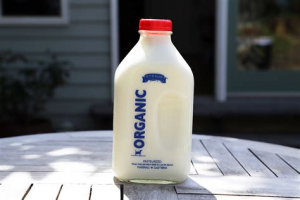In this ever-changing world even our approach to food has evolved over time. While we once relied solely on traditional methods like hunting and farming, today’s so-called “advancements” have led us to bioengineer a plethora of items, including our food.
For those who’ve sought alternatives to dairy, options such as soy, oat, or almond milk have been longstanding favorites. However, there’s a new contender on the horizon: Bored Cow’s bioengineered synthetic milk. As this product becomes more accessible in stores, it’s prudent to recognize that some studies have raised concerns regarding its safety.
If this is the first time you hear about synthetic milk, you’re probably not alone – it’s a relatively new product. But novelty aside, synthetic milk is filled with unstudied compounds and other unsavory chemicals you should know about. Bottom line, after you read the rest of this post, I feel confident that you’ll want to avoid this toxic product.
novelty aside, synthetic milk is filled with unstudied compounds and other unsavory chemicals you should know about. Bottom line, after you read the rest of this post, I feel confident that you’ll want to avoid this toxic product.
It amazing to note that have been making engineered versions of naturally occurring foods for the better part of 100 years! Since the intersection of capitalism and veganism in the 70s and 80s, these mock milks and mock-meats have become more common, with dairy and meat-free alternatives in every section of the grocery store.
It must be noted, however, that even though these foods are imitations of meat, milk, or other animal products, they are not synthetic. Synthetic meat and dairy are created in a laboratory using proteins that have never touched an animal but are based on animal proteins.
The goal is to create humane meat and dairy that provide the same nutritional profile and taste while avoiding the need to gather milk or slaughter livestock. On paper, this sounds like the future of food, but it does not bear out well in practice.
Many countries throughout the world have completely banned synthetic meats, pointing out the fact that there has not been anywhere near enough rigorous scientific testing to ensure that these foods are safe. One of the main problems with synthetic meat, for instance, is that although it contains proteins and amino acids you would find in animal products, it lacks the complete nutritional profile that real meat has.
Using the Bored Cow synthetic milk as an example, independent food safety coalitions tested it from the supermarkets in America where it was available. They found that it lacked riboflavin, Omega-3 fatty acids, and several other key vitamins and minerals that are naturally occurring in cow’s milk.
What they found in place of those key vitamins and minerals were 92 unstudied and unspecified compounds and a fungicide in relative abundance. Because the milk is created through a process of fermentation, the added fungicide is present to prevent the growth of harmful fungus, but it’s still not something that you want in your body.
So instead of providing all the healthy, nutritious benefits of real organic cow’s milk, you’re paying significantly more for synthetic milk full of fungicide and untested compounds. Does that sound like a good deal for your health?
If you genuinely care about animals, you don’t need to go all the way into veganism or synthetic meats and dairy to improve your health or the well-being of livestock. While it is true that factory farming is largely harmful to the environment, humans, and animals, you can avoid factory farms!
 Consider buying organic, 100% grass fed meat or pasture raised milk at your local grocery store. Organic certification is rigorous, and organic farms are typically smaller and run by people who actually care about the animals, crops, and people they sell to.
Consider buying organic, 100% grass fed meat or pasture raised milk at your local grocery store. Organic certification is rigorous, and organic farms are typically smaller and run by people who actually care about the animals, crops, and people they sell to.
Opting for produce directly from a local family farm surpasses the benefits of purchasing organic items from supermarkets. Community Supported Agriculture (CSA) initiatives and nearby farms often prioritize free-range conditions for their livestock. These animals graze on nutrient-rich grass rather than grains sprayed with toxic chemicals. The sunshine and fresh air that nourish this grass enhance the nutritional content of the meat and milk, offering a rich profile of omega-3s, essential vitamins, and minerals.
There may be a lot to dislike about the “modern” food production system, but creating synthetically produced foods will not solve anything. If you’re going to consume dairy and meat products, always consider buying them from local farmers and understand that when you pay more for food that is not factory-farmed, it’s better for every step in the food production chain and the health of your family. Real food for real health, especially if your goal is to enjoy “the best performance of your life!”
God bless,
DrB
Sources for this article include:
Childrenshealthdefense.org



